Bees are not in Danger
I repeat, the bees are fine. Of course, before I get too much further, let me define bee in this context.
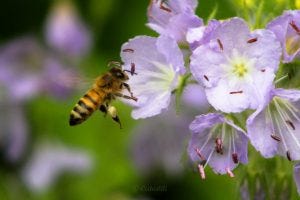
Honeybee, Apis mellifera, the most common assumption when the word 'bee' is used.
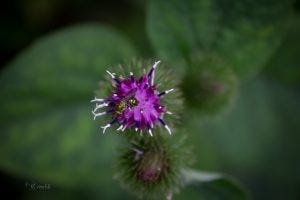
A small North American native bee, Augochlora pura. Also a bee, but often overlooked.
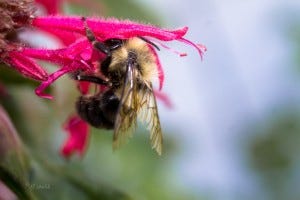
Bumblebee, one of many species of the fuzzy big bees. These are common in gardens and people notice them, but usually don't realize how many different kinds there are around them.
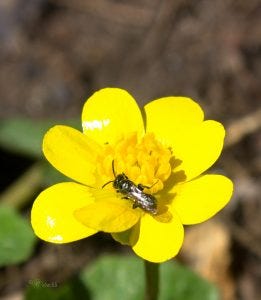
Halictid Bee, another of the small native pollinators often overlooked due to their small size.
So, these are a few of the bees I've photographed over the years. As you may be able to tell, I'm rather fond of the genus order Hymenoptera overall (see my Wasp Apologia for the other side of this, the argument for the insects no-one loves). Bees are cute, fuzzy, and they pollinate crops, which means more food for us. So it's no small wonder that the mass media hysteria surrounding the 'beepocalypse' has gained huge traction. It really doesn't matter that there was no scientific evidence backing the claims being made. It didn't matter that claims of the honeybee's demise were premature, and that the honeybee's disappearance would not, in fact, turn the whole Earth into a starving dust bowl. It sounded good on TV and for most people, that's where their desire to know things begins and ends.
Reality is something else entirely. I've been shouting into the wind about this for coming on five years now, and I have no doubt that this article, like the others I've written, read, and contemplated writing, will do nothing to stem the tsunami of deliberate misinformation and ignorance. But I have to try. Because just like the anti-vaxxers, the pro-bee movement is not what it seems on the surface. When there is a concerted effort to whip up mass hysteria, and to ignore the evidence, it's not just for the publicity. But that's another discussion...
Looking, for the moment, at honeybees in particular, we are seeing that far from being devastated by Colony Collapse Disorder, there has been an increase in their numbers. The pesticide most often blamed for bee death is neonicotinoids, which are applied to crops and taken up into the plants to kill pests when they eat the plant. Which bees do not, so you may be pardoned confusion over how bees are affected by this. The neonics are taken up into pollen, which bees do eat. However, "there is no scientific evidence to link neonicotinoids as the major cause of colony declines" even when the bees were fed 20 times the amount normally expected to be found in their usual foraging. Science has shown that, in direct opposition to what is being shown in media, low doses of pesticides and bacteria in combination can actually have a beneficial effect on bees. But the EU banned neonics... only that "legislation was at no time based on a direct link on bee mortality." In fact, honeybees in Europe are overall healthier than they were in the past, as shown by overwintering hive survival.
And what about the wild bees? Well, there are not a lot of species that visit the crops, and none of the endangered species contribute to agricultural pollination. What does this mean? That we shouldn't do anything about the poor endangered species of bees? No... but what it does tell me is that they are not endangered because of pesticides. They don't visit the same places where pesticides are used. And the bees who are exposed? Can be encouraged greatly with simple conservations measures like leaving strips of wildflowers blooming in between fields. What doesn't show negative effects on the wild bee populations? Stopping pesticide treatment or moving the times agricultural activities are carried out.
Here's the takeaway from this: honeybees are doing just fine. Beekeepers who rely on them for their livelihood, and who treat for varroa mites, who move their bees from place to place following the crops to pollinate, often have healthier hives than the little guy in the backyard who doesn't treat and neglects his hive. If he would treat for the mites, he'd not have to worry about losing his hive, and he wouldn't be adding to the hysteria by falsely reporting that he lost his hive to CCD - he lost his hive to neglect, more often than not. Wild bees are also going to be okay. If you want to help the bees, plant wildflowers and grow your gardens. Don't run out and pick up a random pack of wildflower seeds - that's not going to help your local bees, who probably have specific host plants they prefer. Let some of your lawn return to nature, and enjoy the pleasant hum of the happy bees.
And don't buy into the bee hysteria. Colony Collapse Disorder hasn't been seen in years, it never affected the wild bees, and it's not responsible for the collapse of biodiversity. If you see an article talking about bees, check to see if they mean wild bees, honeybees, or what. If you hear about the demise of the bee, with a photo of a honeybee, take it with a big grain of salt. What are they talking about? A single rare species bee? Most likely. While sad, it's not the dramatic apocalyptic scenario they are trying to make it out to be.
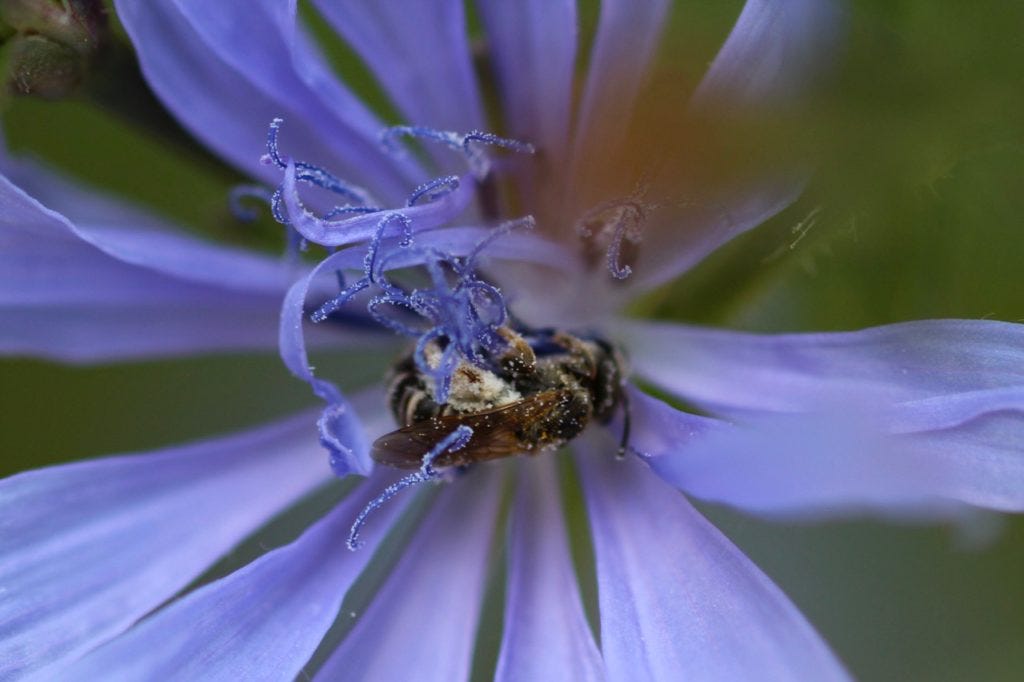
Wild Bee on Chicory. Photo taken by Cedar Sanderson 07/28/2018




